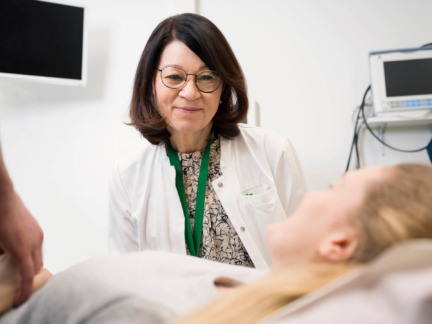Co-parenting
Co-parenting makes it possible to have a child in a situation where people wish to have a child without engaging in an intimate relationship.
Co-parenting is an increasingly common family form, in which the parents systematically share parenting responsibilities without a relationship. There may be several parents in a co-parenting family or it may involve a parenting relationship agreed between two people.
Fertility treatments can be used to help co-parenting parents pursue their dreams of having a child.
If you wish to become a co-parent, you can get started by booking a first appointment with a Felicitas Mehiläinen infertility specialist.
You can also discuss the variety of treatment options available in advance with an infertility nurse. The first appointment with an infertility nurse is free of charge.
Progress of fertility treatment in co-parenting
To choose the best treatment option, it is important to first study the woman’s and man’s fertility. A treatment plan is drawn up together based on this. At a therapist’s appointment, we will review legislative matters and matters related to your life situation as well as think about your future life with the child.
The most common form of treatment is insemination. It can be carried out in the natural menstrual cycle or with the help of medications that support ovulation. If necessary, in vitro fertilisation treatment can be used as it is a more effective mode of treatment than insemination. The use of donated eggs, sperm or embryos is also possible.
Progress of treatment:
- First appointment with an infertility specialist and preliminary examinations
- Therapist’s appointment, together and separately. Decision to begin treatment.
- Treatment planning, selection of the treatment path and form of treatment. Treatment consent and donation consent. Scheduling infection tests according to the chosen treatment path.
- Possible sperm cryopreservation.
- Insemination or in vitro fertilisation treatment.
Infection samples
Before starting fertility treatments, we carry out blood tests in compliance with the related legislation. This will ensure the safety of our customers and samples with regard to infection transmission during treatments. The required infection tests are hepatitis B, hepatitis C and HIV screening tests. Samples are taken from customers whose gametes are processed in a cell laboratory as well as from those who aim to become pregnant. The exact timing and extent of the examinations depends on the chosen treatment path; the treatment is carried out as a couple’s treatment in accordance with the wishes of the couple or the man can act as the donor of gametes.
Legal aspects of co-parenting in fertility treatments
Parenthood and fertility treatments are regulated by, for example, the Parenthood Act, the Act on Assisted Fertility Treatments and the so-called Tissue Act. According to the Parenthood Act, a child may have several guardians; however, the Act provides that there may be only two legal parents.
Before treatment at the clinic, documents in accordance with the Act on Assisted Fertility Treatments, treatment consent and possible donation consent are prepared, on the basis of which the legal parenthood is determined. A treatment consent is prepared for the party receiving the treatment, which can be a single woman or a couple. A donation consent is made if the man wants to act as a known donor who confirms their paternity. Co-parenting parents can choose for themselves which treatment path they want to take.
Our clinic staff will provide information and advice on different treatment options. We will help you find the best solution for your situation.
Co-parenting treatment paths in infertility treatment
1) You can seek treatment as a couple. In this case, according to the law, you cannot be in a relationship with any other person.
The treatment consent is made for you both and legal parenthood is established for both co-parenting parents as a result. The consent may be withdrawn at the request of either party, in which case the treatments will be terminated and any remaining embryos may no longer be used unless separate consent is given. The use of embryos always requires the consent of both parties.
2) You can seek treatment as a single woman and a male sperm donor who confirms their paternity. The man may be in a relationship with another person.
A woman makes a treatment consent. The man makes a donation consent, the terms of which state that the donation is made to a specific recipient. In the consent, the man states that they want to confirm their paternity.
The man may withdraw their consent if they so wish. In this case, the stored sperm are disposed of. In this situation, however, the single woman can still use the embryos cultured for their own treatment, but the man’s paternity can no longer be confirmed. As a donor, the man has the right to decide on the use of their gametes, but they have no control over the use of the embryos produced from them during the period of validity of the original donation consent. The embryos can no longer be used after the donation consent has expired.
The man may also withdraw the paternity confirmation and continue the validity of their donation consent. In this case, the woman can still use the donor’s cryopreserved sperm or embryos obtained in treatment, but the man’s paternity will no longer be confirmed after the confirmation withdrawal takes effect.
Consent withdrawals and changes to them must always be made in writing at the clinic.
3) Woman in a relationship, families with multiple parents and other family forms.
In fertility treatments, the treatment consent and donation consent determine legal parenthood. If the woman receiving treatment is in a relationship, their spouse will be the second legal parent of the child. A man can act as a sperm donor but cannot confirm their paternity.
Support and guidance for co-parenting
You can get more information about co-parenting and the related legal agreements, for instance, from Rainbow Families Finland. Both international and Finnish studies on the well-being of children in rainbow families show that children feel equally well in rainbow families as in heterosexual families.
Felicitas Mehiläinen provides multidisciplinary support at all stages of the treatment process from your doctor, therapist and nurses. We always aim at a balanced and successful family formation.
We warmly welcome you to your first appointment at Felicitas Mehiläinen!

